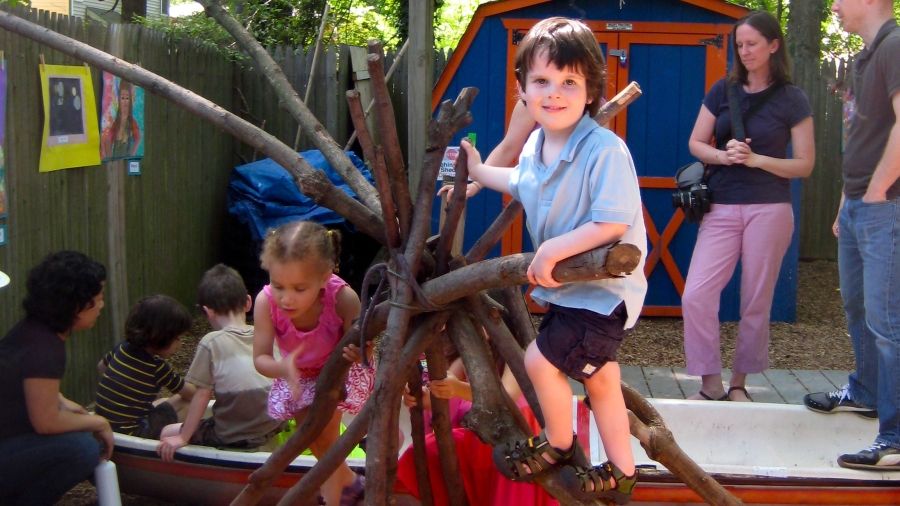
“You’re too high!” one of our co-oping parents tells her 2-year old, her arms reaching up suddenly as if to lift the child down. There is a sense of heartfelt desperation as the words tumble out and arms reach up. This is the first time her child has tried to climb the jumble of planks and logs the older children position just so. The way the four and five year olds build, they bring the word “loose” in “loose parts” to life. To adults this jumble seems rickety, but children find a way to climb on it safely.
The warning goes out, arms go up, and then just as quickly, the parent takes a small, but very visible, breath and steps one tiny half step back. Her daughter continues to walk, tentatively but surely, to the edge of an upturned log. She turns around and slides down the log, laughing.
She couldn’t help herself, the co-oper tells us as she shares her story later during one of our parent meetings, but then she shared how happy she was to see her daughter accomplish this milestone. And this is right and good, both the not being able to help herself, and that she was able to fall back on her co-op training: stay close, but do not interfere. Both the co-oper and the child accomplished something important that day: They both learned that they could take a risk and reach their goal.
Takoma Park Cooperative Nursery School
Our school, Takoma Park Cooperative Nursery School, is a parent cooperative. It’s a small school; we enroll 48 children and their parents. The “and” in that sentence is central. We aren’t looking to enroll just students: we look to shape a community working toward the common goal of building the ideal in early childhood education. We’re all in a learning stance—the parents, the children, and the teachers. Together, we co-create our environment from collecting the logs and branches found on our playground, to building dens and climbing structures from these collections, to learning how to best support the children’s explorations and turning these into opportunities for learning.
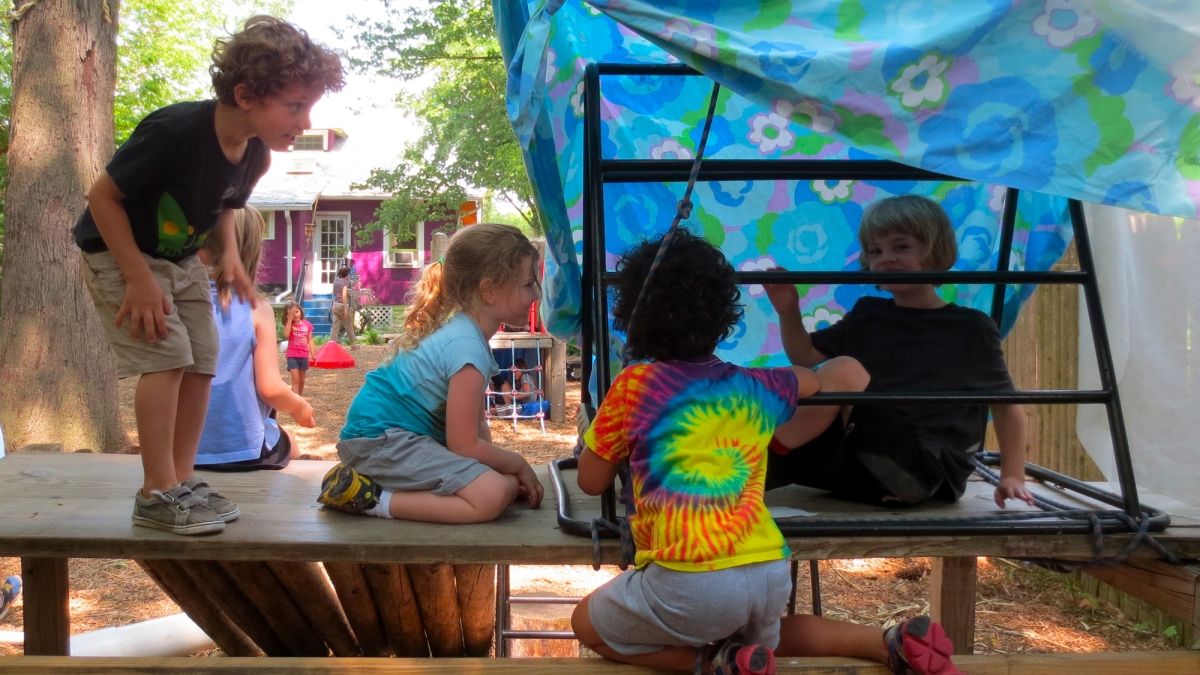
Photo by Lesley Romanoff, Takoma Park Cooperative Nursery School
We employ two trained lead teachers (I work full time and the other teacher is part time) specializing in early childhood education and one part time administrator to help us with bookkeeping, paperwork, and licensing. The rest of the support in the classroom, in administering the school, in future planning, and in fundraising is conducted by parents. Our adult-to-child ratio is high. In each age group we will have one trained teacher and three co-oping parents.
The co-oping schedule is worked out well before school starts and the co-op training is introduced around the same time and extends over the course of the school year. Creating the community that will shape the environment begins immediately and is cultivated and enriched year after year. Our school has been working like this since 1942. And for all its history, the children have scrambled over, around, and through branches and logs in the play yard and the forest with parents and teachers in tow.
Cooperative model schools are founded on democratic principles. The governance of the school is often built on consensus. But the principles of cooperation and partnership can benefit other types of schools and education programs as well. Teaching and learning through partnership is especially important in settings where play and free-flowing adventure are the goal. Here are some of what we see as the essentials in building this partnership, and these can be implemented in any setting.
Create a Culture Where Everyone Counts
Our approach begins by establishing the fact that we all, every single person from youngest child to parent to professional teacher, are on equal footing and have something to offer. Parents become partners in every sense of the word. Their doubts and concerns are part of the conversation just as are their compliments and successes. Teachers are offered the same respect in return.
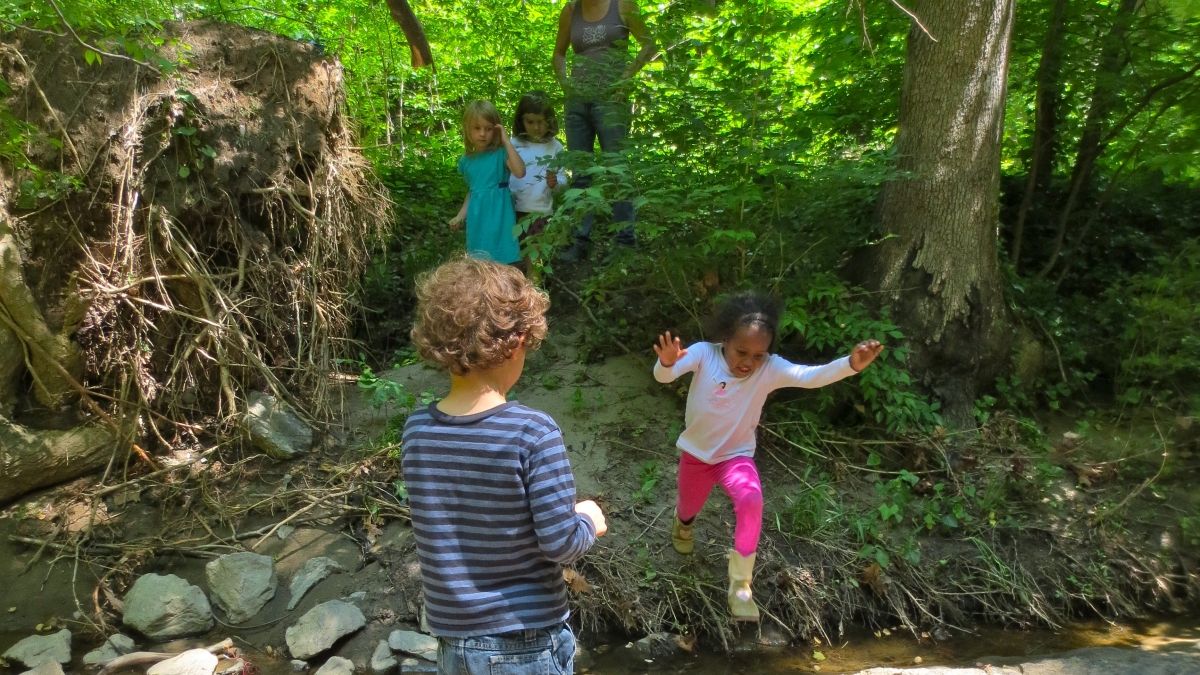
Photo by Lesley Romanoff, Takoma Park Cooperative Nursery School
Educators sometimes feel that our professionalism and knowledge will be called into question if parents are given equal measure in shaping an environment, but this does not happen. In fact, when parents and guardians are brought into the conversation, the environment becomes richer, mainly because teachers become better teachers. While I do consider myself first and foremost, a learner, I play a role in teaching children and other adults about what I know are the important bits of early childhood. We are on this journey together. Every single adult stakeholder, parents and teachers, must understand that we all face risks when putting our ideas out there for others to hear. Yet when we do, we will accomplish great things. We simply must know in advance that the community is supportive.
I would imagine that without this buy-in, educators could struggle with shaping an environment that supports the benefits of risk in a natural setting fearing that there might be repercussions from parents who feel that their concerns might not be heard.
Keep the Lines of Communication Open and Find Common Ground
Open dialogue isn’t always easy. Sometimes parents’ questions are heard as challenges: “Will my child get muddy?” “Are there germs in the dirt we have to be afraid of?” “Will my child get hurt?” But it’s important to remember that these questions aren’t challenging an educator’s position on adventures out-of-doors. These are simply questions and there are also answers. Viewing these as prompts to begin conversations is a great way for parents, teachers, and children to constantly be learning about each other’s concerns and values.
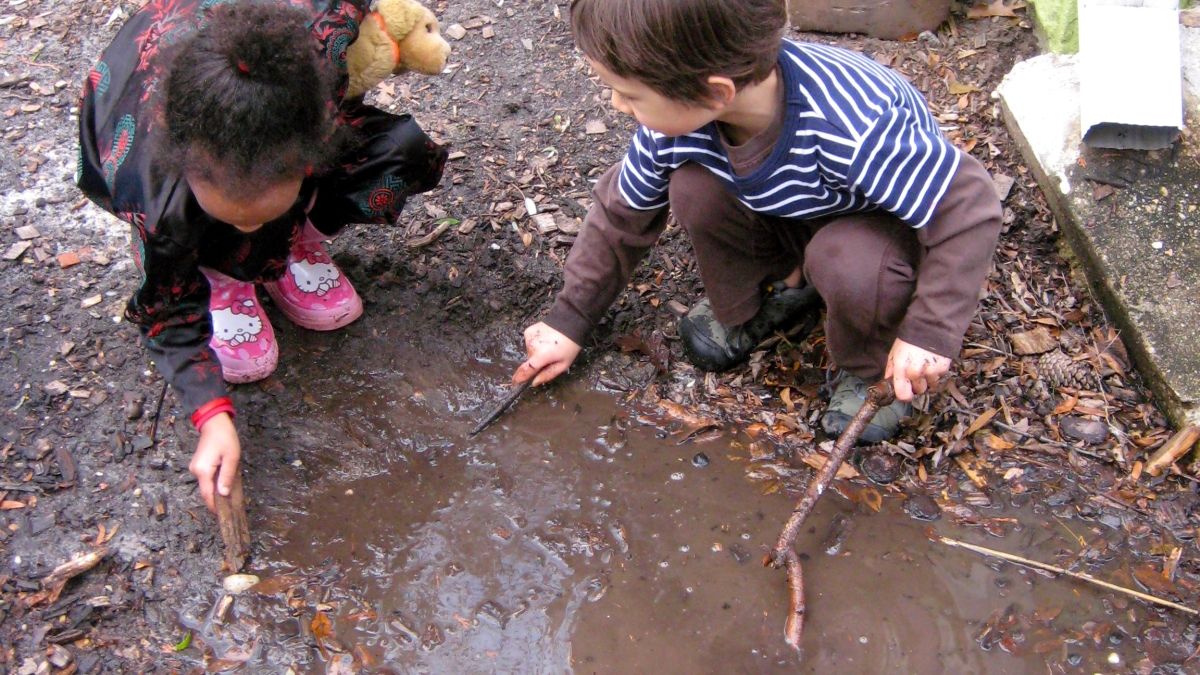
Photo by Lesley Romanoff, Takoma Park Cooperative Nursery School
As teachers, we have access to a lot of information and data that supports our practices. We could flood parents with information, and this isn’t always helpful. More often, “Will my child get muddy?” is actually, “Will people think I am a bad parent when I go to the store with a child whose hair and body are glopped-up with mud?” So talking about the sensory benefits of mud play is beside the point. We would be answering the wrong question and not extending a much-deserved kindness to a worried parent.
We provide regular opportunities for parents to share their views on play and learning as well as concerns and ideas during regular parent meetings. We ask parents to reflect upon and share their own experiences with play. This creates common ground and a common understanding of parents’ concerns, as these are more often directly linked to their recollections of play and how they interacted with educational settings themselves. Of course, teachers also share their experiences! Teachers are part of the community. Once the common ground is found, misunderstandings are easily resolved.
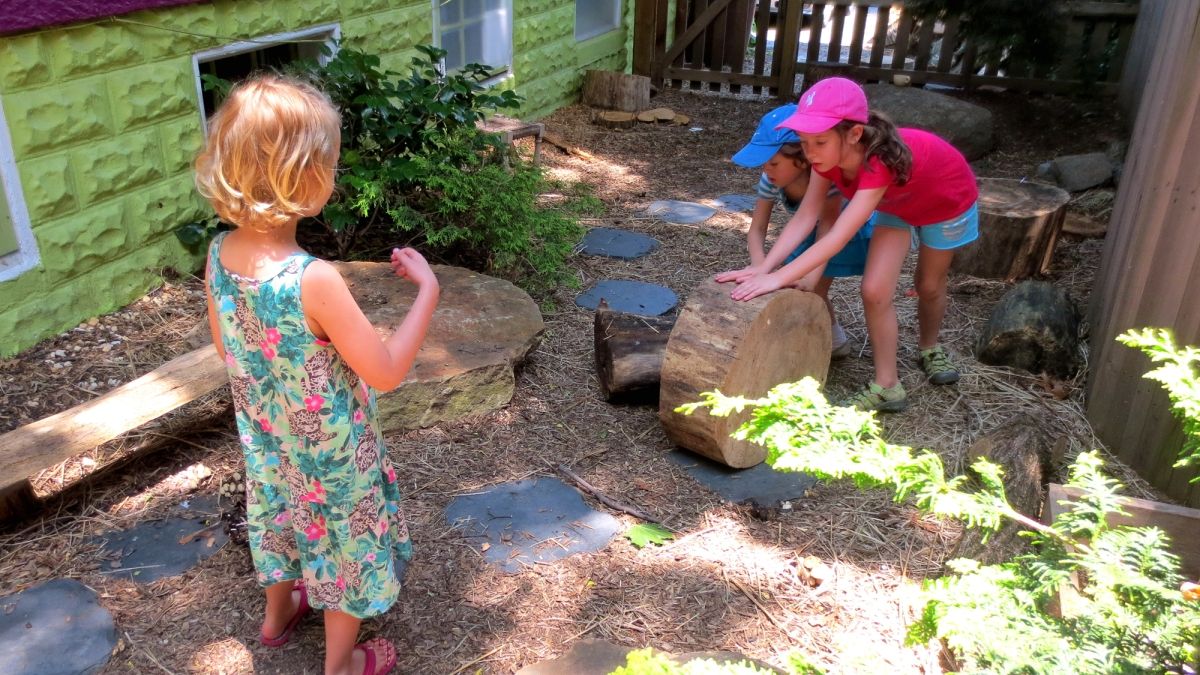
Photo by Lesley Romanoff, Takoma Park Cooperative Nursery School
So much of this is about taking risks. The idea of making mistakes and getting messy isn’t just something we want children to do. In order to begin effectively communicating, we must embrace taking risks ourselves. When the co-op mom who was fearful about letting her daughter climb in the play yard shared her story during a parent meeting a few weeks after the incident, she took a personal risk in sharing. She shared her need to protect her daughter and then she shared how she felt when she stepped back. She knew her story would be met with support and understanding from staff and peers. By making a time and place for this sharing to happen, she was able to make a valuable contribution to the community.
Without this welcoming opportunity, we wouldn’t be able to continue to offer the children the invaluable experiences found in our play yard with its collection of found materials or out in the forest in what we call “the great unknown.”
Be Clear About the Realities of Outdoor Play
Based on conversations we‘ve had with parents, we know they want their children outside and that they embrace play-based environments and the associated rewards of exploring risk. But what does that kind of interaction look like in real life? This is a question that we seek to answer as we work through our parent involvement. Once a parent remarked, “Oh we got caught out in the rain, but it wasn’t a Cooperative School rain,” as a way to describe the difference between a light rain and the drenching kind of rain we sometimes experience on school days.
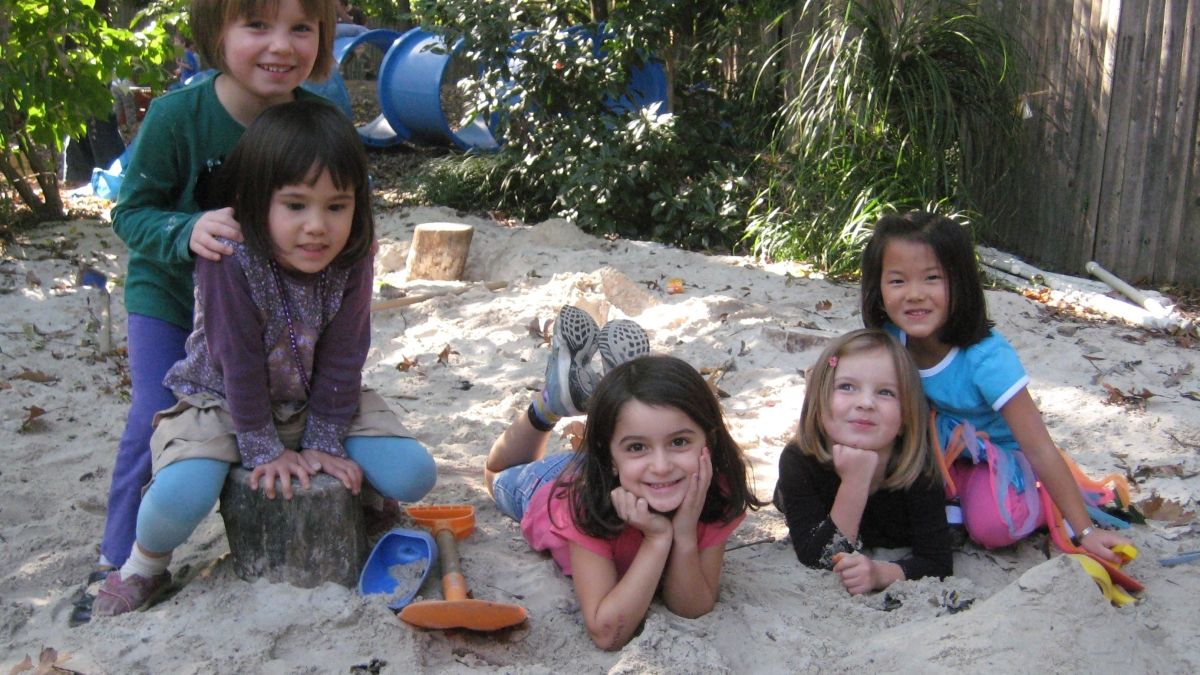
Photo by Lesley Romanoff, Takoma Park Cooperative Nursery School
We imagine that telling parents that we go outside every day simply means that we go outside every day, but parents are surprised by what that actually means and feels like. We go out in the rain and, yes, we do get wet! Of course it is helpful to describe going out in the rain, snow, and heat to parents so that they know what your setting offers. Having photos or videos of children outdoors and articles and other resources will also go a long way in illustrating your approach for prospective parents and guardians.
But the best and most cohesive way to solidify and bolster your approach is to create a platform for partnership. In this way, the environment is created and sustained by everyone who will interact with it during every season—from falling leaves, to caterpillars and hatching eggs, to buzzing mosquitoes, and then on through the mud and snow. The parents, children, and teachers live and learn alongside each other through rain and shine, receiving all the myriad benefits the outdoors have to offer.
About the Author
Lesley Romanoff is the director and lead teacher at the Takoma Park Cooperative Nursery School in Takoma Park, Maryland, and is currently serving as President of Parent Cooperative Preschools International, an international advocacy group for cooperative schools. She teaches both children and their parents in delivering play-based curriculum in an inclusion setting and holds a MAT in Early Child Education. The Cooperative School, its spaces, philosophy, and commitment to the parent-participatory model reflect her approach to early childhood education. Ms. Romanoff has taught graduate level education courses and has presented at NAEYC national conferences. In 2013, she traveled to Iceland to tour schools and presented at the #PlayIceland conference and in 2014 presented at the Nature Preschool Conference at Irvine Nature Center.